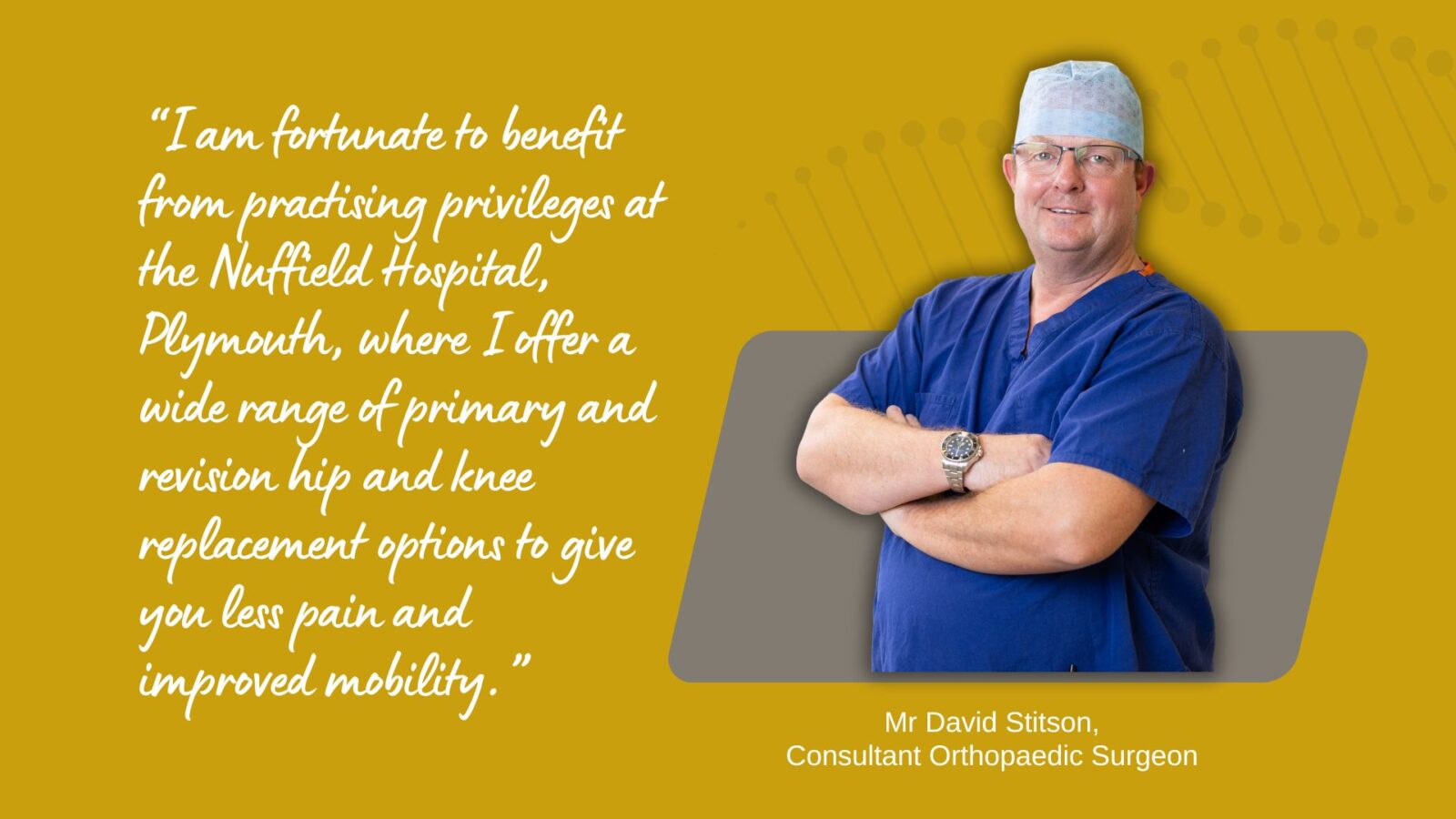In the realm of orthopaedic surgery, hip and knee replacements are among the most common procedures performed worldwide.
Contents
ToggleWhether due to ageing, injury, or degenerative conditions like osteoarthritis, these procedures can significantly improve quality of life by relieving pain and restoring mobility.
However, deciding where to undergo such a significant procedure is a crucial decision that can impact the outcome and overall experience. In this blog, we will delve into the benefits of opting for a private treatment for your hip or knee replacement, as well as shed light on the role of orthopaedic surgeons and how to choose the right one.
Why Choose a Private Orthopaedic Practice?
1. Personalised Care:
In a private practice setting, patients often receive more personalised attention and care. The smaller patient load allows for better doctor-patient relationships, with ample time for consultations and discussions about treatment options.
2. Reduced Wait Times:
Unlike public hospitals where long wait times for elective surgery are common, private practices like the Nuffield Health in Plymouth, typically offer shorter waiting times, allowing patients to undergo surgery sooner and start their recovery journey more promptly.
3. State-of-the-Art Facilities:
Private orthopaedic practices often boast modern facilities equipped with advanced technology and amenities, ensuring a comfortable and efficient surgical experience. From cutting-edge surgical techniques to specialised rehabilitation services, private practices prioritise providing comprehensive care under one roof.
4. Choice of Surgeon:
Patients have the freedom to choose their orthopaedic surgeon based on factors such as expertise, experience, recommendations and patient reviews. This empowers individuals to find a surgeon they trust and feel comfortable with, enhancing confidence in the surgical outcome.
5. Tailored Rehabilitation Programs:
Following hip or knee replacement surgery, rehabilitation plays a crucial role in restoring strength and function. Private practices typically offer personalised rehabilitation programs tailored to each patient’s specific needs, facilitating a smoother recovery process.
Why Would You Be Referred to an Orthopaedic Surgeon?
Orthopaedic surgeons specialise in diagnosing and treating musculoskeletal conditions, including injuries and diseases affecting the bones, joints, ligaments, muscles, and tendons.
You may be referred to an orthopaedic surgeon such as Mr Stitson if you experience:
- Chronic joint pain or stiffness, particularly in the hips or knees.
- Difficulty performing daily activities due to joint dysfunction.
- Traumatic injuries such as fractures or dislocations.
- Signs of degenerative conditions like osteoarthritis or rheumatoid arthritis.
- Limited mobility or range of motion in the affected joint.
Where appropriate, orthopaedic surgeons can offer non-surgical interventions, such as medication, physiotherapy and injections, as well as surgical procedures such as hip or knee replacement, to manage pain and restore function.
What Does an Orthopaedic Consultant Do?
Orthopaedic consultants, also known as orthopaedic surgeons are medical doctors who specialise in the diagnosis, treatment and management of musculoskeletal disorders.
Mr Stitson’s responsibilities include:
1. Diagnosis:
Taking a thorough history to assessment a patient’s symptoms, perform a physical examination and arrange appropriate diagnostic tests such as X-rays, MRI, CT or ultrasound scans and where necessary, blood tests, to determine the underlying cause of the musculoskeletal condition and confirm a diagnosis.
2. Treatment Planning:
Based on the diagnosis, Mr Stitson will create a comprehensive treatment plan tailored to each patient’s individual needs. This may involve conservative measures such as medication and physio therapy or surgical intervention when necessary.
3. Surgical Procedures:
Mr Stitson performs a variety of surgical procedures to address musculoskeletal problems, ranging from arthroscopic surgery for minor joint conditions or injury to complex joint replacement surgery including hip and knee replacement or revision hip or knee replacement.
4. Postoperative Care:
Following surgery, Mr Stitson will oversee each patient’s postoperative care, monitoring their progress, managing symptoms and adjusting treatment plans as needed to ensure optimal recovery and rehabilitation.
How to Choose an Orthopaedic Surgeon?
When selecting an orthopaedic surgeon for your hip or knee replacement surgery, consider the following factors:
1. Credentials and Experience:
Look for a surgeon who is on the Specialist Register in Orthopaedic Surgery (This route involves completing the 2-year UK core surgical training programme (CST) followed by the 6-year Trauma & Orthopaedic (T&O) UK Surgery higher surgical training programme) and has extensive experience performing joint replacement surgery. Review their credentials, including education, training, and surgical volume, to assess their expertise.
Mr Stitson has over 20 years of experience as an orthopaedic surgeon
and is rated 5-star on Doctify.
2. Patient Reviews and Recommendations:
Read patient testimonials and seek recommendations from trusted sources, such as family members, friends, or primary care physicians who have had positive experiences with orthopaedic surgeons.
“Mr Stitson is the most professional surgeon. He is not only professional but also very kind. He takes his time to explain the procedure and what will happen, and I can honestly say he has changed my life. I cannot thank him enough.”
3. Hospital Affiliation:
Consider the hospital or surgical facility where the surgeon practices and ensure it has a reputation for high-quality orthopaedic care, state-of-the-art facilities, and low complication rates.
Mr Stitson benefits from practising privileges at the Nuffield Hospital, Plymouth, where he offers a wide range of primary and revision hip and knee replacement options, together with arthroscopic knee surgery and other general orthopaedic and trauma procedures.
4. Communication and Rapport:
Schedule a consultation with Mr Stitson to discuss your condition and potential treatment options. Pay attention to how well the surgeon listens to your needs and whether you feel comfortable and confident in their care.
Mr Stitson will use his extensive experience to diagnose and provide treatment options tailored to your specific needs as an individual patient.
5. Outcomes and Success Rates:
Enquire about the surgeon’s patient outcomes and success rates for hip and knee replacement surgeries. A skilled surgeon like Mr Stitson should be able to provide data on complication rates, infection rates, and patient satisfaction scores.
Mr Stitson will provide you with the best skills and expertise ensuring that you receive the most appropriate and individually tailored solution to ensure the best outcome possible.
By carefully selecting a reputable orthopaedic surgeon such as Mr Stitson, and opting for a private practice setting such as the Nuffield Plymouth, you can ensure personalised care, shorter wait times, and superior outcomes for your hip or knee replacement surgery.
Prioritise your musculoskeletal health and embark on the path to a pain-free, active lifestyle with confidence and peace of mind.
About Knee Surgery
Knee replacement surgery replaces the worn out, painful and stiff knee joint with a new prosthetic joint. This procedure which may be a partial or a total replacement is normally performed under spinal anaesthesia and is usually followed by a night or two in the hospital. Day-case knee replacement surgery may be an appropriate option for you.
About Hip Surgery
Total hip replacement surgery replaces the worn-out painful and stiff hip joint with a new prosthetic joint. This procedure is normally performed under spinal anaesthesia and is commonly followed by a night or two in the hospital. Day-case hip replacement surgery may be an appropriate option for you.

About Mr Stitson
David Stitson is a Plymouth-based Consultant Trauma and Orthopaedic Surgeon. Trained both in the UK and internationally, he has worked in medicine for more than 20 years for the NHS, for the Royal Air Force and in private practice. Mr Stitson operates privately at the Nuffield Health Hospital, Plymouth.

The Nuffield Plymouth CQC Rating
The Nuffield Hospital has a history that spans over half a century and has built a reputation for high standards of care, professionalism and expertise in delivering health services. They aim for continuous quality improvement in everything they do.
Active Quality and Governance programmes are in place at the Nuffield Hospital Plymouth. As part of this, the hospital is inspected by independent healthcare regulators to ensure it meets the fundamental standards of quality and safety as determined by the regulating body (CQC).
In the most recent inspection, Plymouth Nuffield Hospital was rated as ‘Good’ overall, however, the surgical element of the inspection was rated as ‘Outstanding’. The hospital was referred to as:
“Outstanding in effective and caring, and
Good in safe, responsive and well-led.”





